Prosopis is a genus of trees and shrubs from the Fabaceae family. The trees can grow up to 30 ft (9 m) tall, even though in most cases they are the size of a shrub. They have narrow, sharp-tipped leaves, from 50 - 75 mm long, while the fruits consist of pods with bean-like seeds.
The branches of the tree have a characteristic zigzag shape. Some species of prosopis have sharp, needle-like spikes, reaching lengths up to 75 mm. The spikes are strong enough to go through the sole of a shoe and can easily flatten a tire.
Most species are very tough and drought resistant since they have a deep root system that hosts bacterial colonies that retain nitrogen, which is very important for the growth of the plants and is also turned into a food protein.
Prosopis is widespread in dry regions around the world, including parts of South America and the Southwest US. Prosopis trees are also found in the Chihuahuan Desert in Mexico.
Species of Prosopis
There exist about 45 species of prosopis trees and shrubs, located in the tropical and subtropical regions of North and South America, Africa, West Asia and South Asia, with the most widespread species among them being the honey mesquite, velvet mesquite and screwbean mesquite.
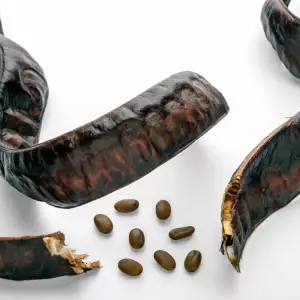
Prosopis glandulosa or honey mesquite is a tree from the Fabaceae family, reaching up to 30 ft (9 m) tall. It blooms from March to November, forming pale yellow, elongated seed pods. It's found in the southwestern part of the US and in Mexico. It's considered an invasive species that spreads very quickly.
Velvet mesquite or Prosopis velutina belongs to the same family (Fabaceae) and reaches 30 ft (9 m) tall. The young branches of the plant are green. Initially the bark is reddish-brown and smooth, eventually darkening and becoming crumbly. Yellow spikes 1" long appear on the branches. The leaves of this species are soft and reach 6″ (15 cm) long.
The screwbean mesquite or Prosopis pubescens also belongs to the Fabaceae family. This species is widespread in Texas, Arizona, California and elsewhere. It reaches up to 23 ft (7 m) tall and has a light brown bark. It grows short, straight spikes, up to 1 1/4″ (3 cm) long. The seedpods of the plant are twisted in a unique way, resembling screws.
Composition of Prosopis
Prosopis contains proteins, it has a low glycemic index and is a good source of easily digestible fibers which dissolve slowly and don't cause a sharp rise in blood sugar. Prosopis is also an excellent source of calcium, iron, lysine, manganese, zinc, magnesium, potassium, and dietary fiber.
Benefits of Prosopis
In the desert regions of North America, the pods and seeds of prosopis have long been used as a source of food for locals. They would grind prosopis to powder, to use it as flour, a sweetener or as the main ingredient of sweet drinks and fermented alcohol. For thousands of years, Native Americans in the Southwest parts of the US and in Mexico regularly consumed prosopis, which led to those communities barely ever having diabetes.
Prosopis is a wonderful natural remedy. Mesquite flour effectively balances blood sugar since its sugars are in the form of fructose, which requires no insulin to metabolize; the ground seeds help maintain a constant level of blood sugar for extended periods. Prosopis improves diabetics' diet and improves the function of the pancreas.
Powdered prosopis or tea from prosopis can be made from the leaves and roots, as well as the bark of the tree. Even today, prosopis is used in the production of all kinds of remedies or the plant itself is used as an herb, primarily to treat wounds, for eye problems and skin diseases. It's also known for the beneficial effects it provides the digestive system. Prosopis also helps against insect stings and light infections. The leaves of prosopis are used to make tea for treating headaches and stomach pains. In the past, this type of remedy was used to treat eye inflammation as well.
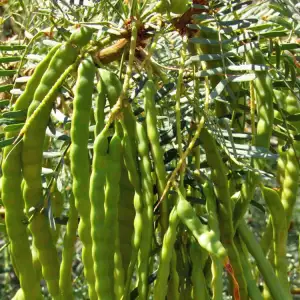
The body absorbs prosopis significantly slower than the other species of the bean family and maintains the feeling of satiety. Since the plant lowers blood sugar levels, the body experiences less stress and the pancreas gradually normalizes its function. Extended usage of prosopis can lead this organ to fully restore its functions.
Today there is still debate over whether this plant is a tree or shrub. But the position that prosopis is life-giving is undeniable.
Mesquite flour is considered a unique superfood with high amounts of nutrients and a refined gentle taste.
Mesquite flour is considered a unique superfood with high amounts of nutrients and a refined gentle taste. Besides its value as food, mesquite flour has social and ecological significance. Putting mesquite products, grown in the dry regions, up for sale, helps spread these plants, which in turn compensates for their being chopped down and turned into charcoal and other products of modern industry.
Prosopis in Cuisine
Powdered prosopis can also be added as a sweetener to drinks. Regular inclusion of mesquite flour and powdered mesquite in food has numerous advantages. Dishes and drinks with mesquite have a lower content of carbohydrates and fats, a higher content of fiber and are naturally sweet, i.e. no calories, making us feel guilty every time we eat them.
Thanks to its natural sweetness, prosopis is also incredibly suitable for diabetics. Mesquite flour can be added to cakes, roasted meat, salads and more.
Prosopis can be used in all kinds of raw crackers, breads, biscuits, pies and other sweet goods as an aromatic sweetener or in combination with other grain flours.
The high levels of lysine make prosopis a valuable ingredient in making certain types of biscuits and dehydrated foods, in which lysine quantities are lower.
The molasses-like flavor and light caramel aftertaste transform it into the perfect complement to various beverages (tea, coffee, fresh-squeezed juices and smoothies). It combines excellently with nut, grain, milk, yoghurt and fruit spreads.
As a spice, prosopis can be added to soups, sauces and nearly all sorts of vegetable dishes. Powdered prosopis is a fine addition to raw or cooked desserts.
If you would like an idea on how to decorate your desserts or cream soups, simply sprinkle them with mesquite flour. This will not only enhance their nutritional value but you'll also be guaranteed optimal health.
Recipe for Banana Bread with Prosopis
Ingredients: 3/4 cup mesquite flour, 1 cup flour, 2/3 cup sugar, 1/2 tsp baking soda, 1 cup mashed bananas, 2 tsp baking powder, 1/3 cup butter, 1/2 cup milk, 2 eggs, 1/4 cup ground walnuts, 1/4 tbsp salt.
Preparation: Mix the mesquite flour, sugar, baking powder, baking soda and salt together. Add the banana puree, butter, eggs and milk. Beat the mixture on a low setting until all of the ingredients mix, then turn it on high for 2 min. Add the flour. Beat once again and add the nuts. Pour the mixture into a buttered tray. Bake the banana bread about 1 hour at 660°F (350 °C). Then let the banana bread cool and remove it from the tray.
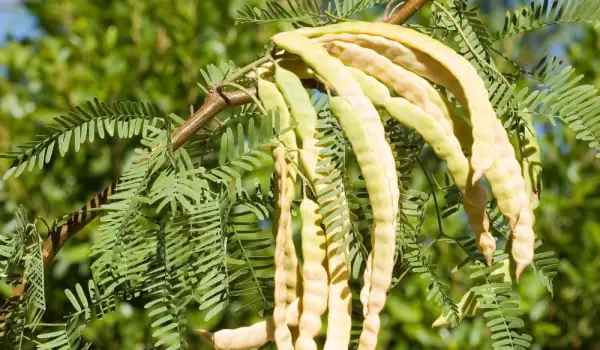



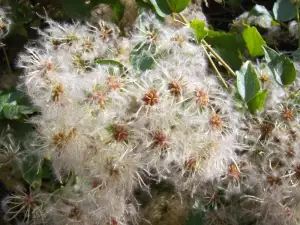
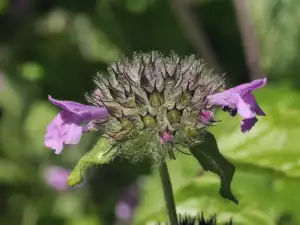

Comments